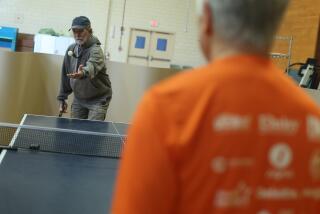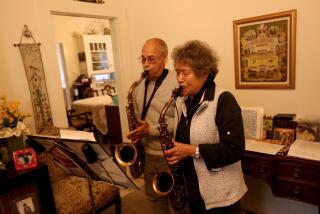‘One of older people’s complaints is that people don’t touch them anymore.’
- Share via
Paul Kelley is a social-work major at Cal State Northridge. He attends classes, does volunteer case management at the Bernardi Multipurpose Senior Center in Van Nuys and rounds out his 80-hour work week as a psychiatric night nurse at Valley Hospital Medical Center.
I made up my mind a year ago to work in gerontology. I’ve always felt comfortable with older people. I guess I’m sort of an old-fashioned guy. I’m not really impressed by everything that’s new. I like things that are seasoned and established and dependable.
Everyone seems to be so oriented toward prestige and status and getting ahead and making money. Everything has to be new and beautiful and young and smooth. They forget about the person who actually provided all that they have in the first place. Our seniors are the ones who brought us here.
One of older people’s complaints is that people don’t touch them anymore. They’re looked past. They are not considered equals. People talk down to them. When you hug another person who hasn’t been touched in a long time, it’s a very moving experience. So often people are almost repulsed by them, which is so sad.
One client in the Valley lived in a house that was very dirty. She was totally unable to take care of herself, and yet she was unwilling to let me or anyone else come into the house. She needed to see a doctor, and she needed to have her house cleaned. Yet you have the dilemma. She has every right in the world to live that way. That is one of the most difficult things about being a social worker, determining when does society intervene and when not.
When I see a person unable to care for herself, I have to feel bad for them. This is a person who was once young, who was vivacious. She was once a 10-year-old, with a mom and dad. Then she was a 20-year-old and getting married and having kids. And then she was 40. The kids were growing up, and she was getting into something new. Now she is maybe 70 or 80, and she sees her life totally changing and herself becoming more dependent and unable to care for herself. Yet she is still that very same person who was a child. That young woman is still inside this elderly person.
Another client, a woman in her late 80s, lived alone in a trailer with no lights, just sitting there in the dark, alone and isolated. When we went out there, she was very frightened of men. It’s taken a long time to develop a rapport with her. Now she says, “Oh, your visit is like a shot in the arm.” But once upon a time it was, “Oh, go away!”
One of the most important things to do when you talk to the client is to forget about your own self. Look at the client as a human being and see them as an individual. Be aware of their tone of voice and their environment and listen to what they’re saying and don’t interrupt. Don’t try to think of responses or try to be clever or come up with some sage remark. While you’re trying to think of these wonderful things to say, you’re not hearing them anymore. You have to really just tune in.
You have to remain objective. It’s a skill that takes a lot of practice. Once I was with an older woman who was talking about how her son passed away. He died young. She was crying about his death, and suddenly I missed my dad so much because he passed away I felt like crying too. I was there with her, and yet it triggered something in me. It’s OK to be real, it’s OK to cry with the client and to laugh with them, but you can’t let yourself go. You have to remain professional in the sense that you are the helper. Sometimes it’s not so easy because you might like them a lot.
I’ve got the kind of job that I don’t get the feeling when I get up in the morning of, “Oh, I’ve got to go to work.” When I get to work, I’m happy. I like it. Everybody I work with is so supportive and loving, they really care. They really do.


